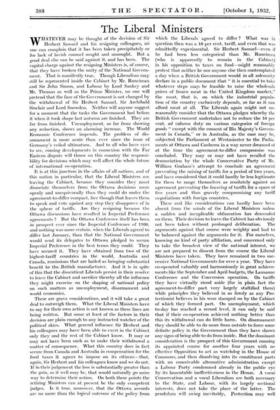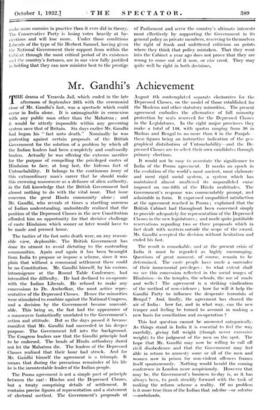The Liberal Ministers
WHATEVER may be thought of the decision of Sir Herbert Samuel and his resigning colleagues, no one can complain that it has been taken precipitately or for lack of lavish counsel sought and unsought. But a good deal else can be said against it, and has been. The capital charge against the resigning Ministers is, Of course, that they have broken the unity of the National Govern- ment. That is manifestly true. Though Liberalism may still be represented inside the Cabinet by Mr. Runciman and Sir John Simon, and Labour by Lord Sankey and Mr. Thomas as well as the Prime Minister, no one will pretend that the face of the Government is not changed by the withdrawal of Sir Herbert Samuel, Sir Archibald Sinclair and Lord Snowden. Neither will anyone suggest for a moment that the tasks the Government had before it when it took shape last autumn are finished. They are far from finished. Unemployment, so far from showing any reduction, shows an alarming increase. The World Economic Conference impends. The problem of dis- armament is more acute than ever since the issue of Germany's veiled ultimatum. And to all who have eyes to see, coming developments in connexion with the Far Eastern dispute will throw on this country the responsi- bility for decisions which may well affect the whole future of international co-operation.
It is at this juncture in the affairs of all nations, and of this nation in particular, that the Liberal Ministers are leaving the Cabinet, because they consider they must dissociate themselves from the Ottawa decisions more openly and unequivocally than they could do under the agreement-to-differ compact, free though that leaves them to speak and vote against any step they disapprove of in the sphere of tariffs. Are they resigning because the Ottawa discussions have resulted in Imperial Preference agreements ? But the Ottawa Conference itself has been in prospect ever since the Imperial Conference of 1930, and nothing was more certain, when the Liberals agreed to differ last January, than that the National Government would send its delegates to Ottawa pledged to secure Imperial Preference in the best terms they could. They have secured it. They have obtained from two of the highest-tariff countries in the world, Australia and Canada, remissions that are hailed as bringing substantial benefit to the _British manufacturer. And it is in spite of this that the dissentient Liberals persist in their resolve to leave the Cabinet and sacrifice thereby all the influence they might exercise on the shaping of national policy on such matters as unemployment, disarmament and world economics.
These are grave considerations, and it will take a great deal to outweigh them. What the Liberal Ministers have to say for their own action is not known as these lines are being written. But some at least of the factors in their decision are plain enough to any instructed watcher of the political skies. What general influence Sir Herbert and his colleagues may have been able to exert in the Cabinet only they and the rest of the Cabinet knOw. It may or may not have been such as to make their withdrawal a matter of consequence. What this country does in fact secure from Canada and Australia in compensation for the food taxes it agrees to impose on its citizens—that, again, Sir Herbert and his colleagues know and we do not. If in their judgement the loss is substantially greater than the gain, as it well may be, that would naturally go some way to determine their action. On both these points the retiring Ministers can at present be the only, competent judges. Is it true, moreover, that the Ottawa accords are no more than the logical outcome of the policy from which the Liberals . agreed to differ ? What was in question then was a 10 per cent. tariff, and even that was admittedly experimental. Sir Herbert Samuel—even if he had been less categorical than Mr.- Runciman (who is -apparently to remain in the Cabinet) ill his opposition to taxes on food—Might -reasonably protest that neither he nor anyone else then contemplated a day when a British Government would in all solemnity declare in a public document that " it is essential to take whatever steps May. be feasible to raise the wholesale prices of frozen meat in the United Kingdom market," the meat, that is, on which the industrial popula- tion of the country exclusively depends, so far as it can afford meat at all. The Liberals again might not un- reasonably consider that the Ottawa pledges whereby the British Government undertakes not to reduce the 10 per cent. ad valorem duty on various categories of foreign goods " except with the consent of His Majesty's Govern- ment in Canada," or in Australia, as the ease may be, subjected the Parliament at Westminster to the Parlia- Meat§ at Ottawa and Canberra in a way never dreamed of at the time the agreement-to-differ comprOmise was concluded. They may or may not have recalled the denunciation by the whole Conservative Party of Mr. William Graham's attempt to conclude an agreement Preventing the raising of tariffs for a period of two years, and have considered that it could hardly be less legitimate for them to range themselves as resolutely against an agreement preventing the lowering of tariffs for a space of five years and thus gravely compromising any tariff negotiations with foreign countries.
These and like considerations can hardly have been absent from the minds of the Liberal Ministers unless a sudden and inexplicable obfuscation has descended on them. Their decision to leave the Cabinet has obviously not been taken without prolonged deliberation. The arguments against that course were weighty and had to be balanced against the arguments for it. For ourselves, knowing no kind of-party affiliation, and concerned only to take the broadest view of the national interest, we are not prepared to dissent from the course the Liberal Ministers have taken. They have remained in two suc- cessive National Governments for over a year. They have co-operated valuably and harmoniously in great achieve- ments like the September and April budgets, the Lausanne Conference and the Conversion operation. On tariffs they have virtually stood aside (for in plain. fact the agreement-to-differ pact very largely stultified them) -while principles they believed in as firmly as any Pro- tectionist believes in his were stamped on by the Cabinet of which they formed part. On unemployment, which to-day has reached a record level, it can only be said that if- their co-operation achieved nothing better than this its withdrawal can do little harm. On disarmament they should be able to do more from outside to force some definite policy in the Government than they have shown any signs of being able to do from inside. But the dominant consideration is the prospect of this Government running its appointed course for another four years with no effective Opposition to act as watchdog in the House of -Commons, and then dissolving into its constituent parts with no conceivable alternative administration except a Labour Party condemned already in the public eye by its lamentable ineffectiveness in the House. A vocal Conservatism and a vocal Liberalism are both necessary to the State, and Labour, with its largely sectional interests, does not take the place of the latter. The :pendulum - will -swing inevitably. Protection, may well make more enemies in practice than it ever did in theory. The Conservative Party is losing votes heavily at by- elections and will lose more.. Under those conditions Liberals of the type of Sir Herbert Samuel, having given the National Government their support from within the Cabinet through the most critical period of its existence and the country's fortunes, are in our view-fully justified in holding that they can now minister best to the prestige of Parliament and serve the country's ultimate interests most effectively by supporting the Government in its general policy as private members, reserving to themselves the right of frank and unfettered criticism on points where they think that policy mistaken. That they went into the Cabinet a year ago does not prove that they are wrong to come out of it now, or rice vers.& They may quite well be right in both decisions.















































 Previous page
Previous page